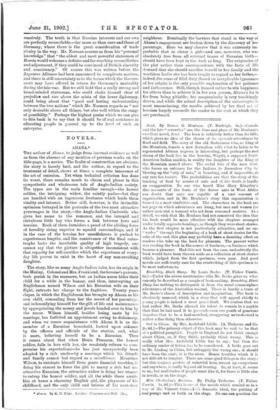Scud. By Ernest G. Henham. (T. Burleigh. 6s.)—Canada and the
late "seventies" are the time and place of Mr. Ilenham's excellent novel, Scud. The book is infinitely better than its title, which gives no idea of the charm of its open-air adventures by flood and field. The story of the old Scotchnia,u who, as King of the Mountain, founds a, new Jerusalem with what he holds to be regenerated African negroes is interesting, but perhaps the real charm of the book lies in the heroine, Wapiti, a supposed North American Indian maiden, in reality the daughter of the King of the Mountain named above. Tho awful fate of the man Saul. who forces an entrance for the Indians to Jerusalem City by blowing up the "city of ants," is haunting, and if impossible, at any rate ben, trovato. The probabilities are that the story of the tracking of Saul by armies of ants and of his death is hardly an exaggeration. No one who heard Miss Mary Kingsley's dire accounts of the feats of the driver ants in West Africa can doubt that ants are capable of a vast amount of organisation, and in Mr. Henham's story this organisation is turned to a most vindictive end. The characters in the book are not pegs on which adventures are hung, but men and women (or rather men and a woman) who act from reasoned motives. As a detail, we wish that Mr. Henham had not conceived the idea that his book would be more effective with the chapters arranged under totally separate headings, as though they were short stories. As the first chapter is not particularly attractive, and no one " wades " through the beginning of a book of short stories for the sake of the end, this plan may probably have a daunting effect on readers who take up the book for pleasure. The present writer was reading the book in the course of business,—a business which became a pleasure. Had this not been the case, undoubtedly the book would have been thrown aside as a collection of short stories which, judged from the first specimen, were poor. And good novels are sufficiently rare for the overlooking of this specimen to be most unfortunate.






































 Previous page
Previous page